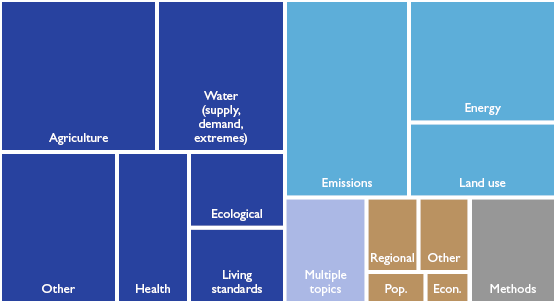
© Trevin Rudy / Unsplash
An international group of researchers has assessed the successes and challenges of working with a set of global socioeconomic and climate scenarios called the SSP-RCP framework. The article has been published in the scientific journal Nature Climate Change. Research professor Timothy Carter from the Finnish Environment Institute Climate Change Programme was a co-author.
A framework for research and policy making
It is important for climate change researchers to visualise the different types of worlds that might plausibly evolve over the coming decades. To this end, the SSP-RCP framework was developed ten years ago by an international group of climate change researchers. It was designed to be used in the study of different aspects of future climate change and to provide a consistent basis for policy making.
|
What is the SSP-RCP framework?
SSPs, shared socioeconomic pathways: a set of alternative socioeconomic development pathways such as population, income, technology or urbanisation. There are five SSPs extending to 2100. They are important both as drivers of greenhouse gas emissions and land use change that affect the climate but also as indicators of how well prepared or vulnerable society will be to face a changing climate.
RCPs, representative concentration pathways: alternative trends of atmospheric concentrations of greenhouse gases and aerosols that affect the radiation balance of the earth, and hence the climate. There are four RCPs (though three more have recently been added) and RCP-based climate projections describe how weather variables such as temperature and precipitation are expected to change in the future under different RCPs.
SSPs and RCPs can be organised in a matrix (the framework). A scenario is formed by combining an SSP with an RCP. By selecting several of these combinations, it is possible to cover a range of possible future socioeconomic and climatic conditions.
|
RCP-based climate projections have been widely adopted by the scientific community, but there is less information about SSPs, which describe alternative future socioeconomic pathways. For this reason, the authors of the article did a review of the literature, identifying nearly 1400 scientific papers that have reported using SSPs. More than a half of the papers centred on impacts and adaptation, nearly a third on mitigation, while the others were hybrid or methodological studies (see Figure).

Who is using the shared socioeconomic pathways SSPs? Areas of rectangles are proportional to the number of studies in each category – 1390 in total (2012-2019). Types of studies: impacts and adaptation (dark blue), mitigation (light blue); multiple topics (blue-grey); scenario methods (grey), regions and sectors (brown; Pop. = population, Econ. = economy). © O’Neill et al., 2020
“The rapidly expanding number of publications that have applied the SSP-RCP framework, along with its use by the IPCC in its recent and upcoming reports, are a clear demonstration of its success in meeting the immediate scenario needs of various research communities”, explains Carter.
“There is already widespread use of the scenario framework in Finland, especially for projecting future climate using the RCPs”, Carter says. “A major challenge remains to interpret the global SSPs at national and regional scale and for different sectors. For this, we need to work closely with relevant experts, which we have already started to do at SYKE to develop Finnish SSPs for the agriculture and food and the health and social welfare sectors. The current coronavirus situation has also naturally affected speculation about where the world is heading.”
Need for scenarios will continue
The paper identifies seven areas in which improvements are desirable in the coming years:
- Improving integration of societal and climate conditions
- Improving applicability to regional and local scales
- Improving relevance beyond the climate research community
- Producing a broader range of reference scenarios that include impacts and policy
- Capturing relevant perspectives and uncertainties
- Keeping scenarios up to date
- Improving relevance of climate change scenario applications for users
Regardless of whether these improvements are achieved, Research Professor Carter thinks that the need for scenarios may always be with us: “As a wise character remarks in Moominland Midwinter: ‘All things are so very uncertain, and that's exactly what makes me feel reassured’”, he concludes.
More information
- Research Professor Timothy Carter, Finnish Environment Institute, tel. 095 251 094, firstname.lastname@ymparisto.fi
Links
- Full article in Nature Climate Change: Achievements and needs for the climate change scenario framework. O’Neill, B.C., Carter, T.R., Ebi, K., Harrison, P.A., Kemp-Benedict, E., Kok, K., Kriegler, E., Preston, B.L., Riahi, K., Sillmann, J., van Ruijven, B.J., van Vuuren, D., Carlisle, D., Conde, C., Fuglestvedt, J., Green, C., Hasegawa, T., Leininger, J., Monteith, S., Pichs-Madruga, R. 2020.
-
SSP literature database